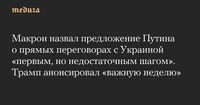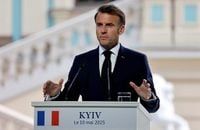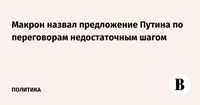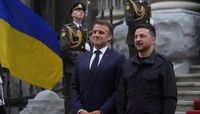French President Emmanuel Macron has responded to Russian President Vladimir Putin's recent proposal for direct negotiations with Ukraine, labeling it as "a first but insufficient step" towards resolving the ongoing conflict. Macron's comments, reported by AFP, come amidst escalating tensions and diplomatic efforts from various international leaders.
During a press conference, Macron expressed skepticism about Putin's intentions, stating, "He is looking for a way out, but he still wants to win time." He emphasized that any negotiations should not be preceded by an unconditional ceasefire, a stance that reflects the complex dynamics at play in the region.
This exchange follows a high-profile meeting on May 10, 2025, where Macron, alongside other European leaders, met with Ukrainian President Volodymyr Zelenskyy in Kyiv. The outcome of this summit was a strong call for a full and unconditional ceasefire from May 12, 2025, lasting a minimum of 30 days. Zelenskyy highlighted the urgency of the situation, demanding that Russia agree to this ceasefire to pave the way for negotiations.
In a significant move, US President Donald Trump also weighed in on the situation through a post on his social media platform, Truth Social. He described the upcoming week as a "potentially great day" for both Russia and Ukraine, noting the potential for saving "hundreds of thousands of lives" if the conflict could come to an end. Trump’s remarks sparked curiosity about whether he was referring to the proposed ceasefire or the possibility of direct talks.
On the evening of May 10, Russian Presidential Press Secretary Dmitry Peskov indicated that the Russian government was considering the proposal for a 30-day ceasefire, but he cautioned that attempts to pressure Russia through threats of increased sanctions would be futile. This statement reflects the Kremlin's longstanding position of resistance against external pressures.
In a press conference early on May 11, Putin reiterated his call for direct negotiations, suggesting that these talks could take place in Istanbul on May 15, 2025. However, he did not reference the proposed ceasefire, which has raised further questions about the sincerity of his offer and the Kremlin's commitment to de-escalation.
Macron's remarks at the summit and subsequent press conference underscore the complexities of the diplomatic landscape. He stated, "An unconditional ceasefire should not precede negotiations," reinforcing the notion that the path to peace requires a more robust commitment from all parties involved.
In the context of these developments, Macron's comments also highlight a broader sentiment among European leaders. They are increasingly concerned about the potential for a prolonged conflict, which could have dire humanitarian consequences. The French president's statement that Putin is "still looking for a way out" suggests a belief that while there may be openings for dialogue, the motivations behind Russia's actions remain questionable.
In response to the ongoing conflict, European nations are preparing to bolster their military assistance to Ukraine. Reports indicate that a new package of military aid is being organized, which includes long-range missiles and interceptor missiles for American Patriot air defense systems. This move reflects a commitment to support Ukraine as it navigates the precarious situation.
The geopolitical implications of these negotiations are significant. The potential for a ceasefire and subsequent talks could reshape the dynamics of the conflict, but skepticism remains high regarding Russia's intentions. The international community is watching closely, as any agreements reached could set the stage for future diplomatic relations in the region.
As the deadline for the proposed ceasefire approaches, the pressure mounts on all parties to come to the negotiating table. The coalition of European leaders, including Macron, has made it clear that failure to agree to a ceasefire will result in new sanctions against Russia. This ultimatum reflects a unified stance among European nations, emphasizing the need for accountability and a commitment to peace.
In conclusion, the unfolding situation surrounding the proposed negotiations between Russia and Ukraine remains fluid and complex. Macron's characterization of Putin's offer as a "first but insufficient step" encapsulates the cautious optimism that permeates diplomatic discussions. With critical deadlines approaching, the world watches to see if these negotiations will lead to a meaningful resolution or if the cycle of conflict will continue.




